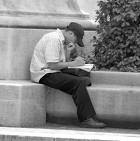Mostly, we’ve been talking here about recommended reading, especially our 10 Books to Read before You Die. But today I came across an entry from the Washington Post’s blog Short Stack that talks about what to skip in literature. The posting mentions a new book called Beowulf on the Beach: What to Love and What to Skip in Literature's 50 Greatest Hits. I have not seen this book, but it sounds intriguing. Its author, Jack Murninghan, has chosen fifty works of literature and goes through each suggesting parts busy readers can skip and parts people should not pass up. The Wahington Post blogger notes books where he went along with Murninghan's recommendations and one (Great Expectations), with which he disagreed.
Personally, I read every word. I don't feel I've read a book if I haven't read all of it. However, I know many people who blithely skim books, skipping parts they consider dull. As the Romans used to say, "De gustibus non est disputandum." If your Lain is rusty, that means there's no accounting for taste.

